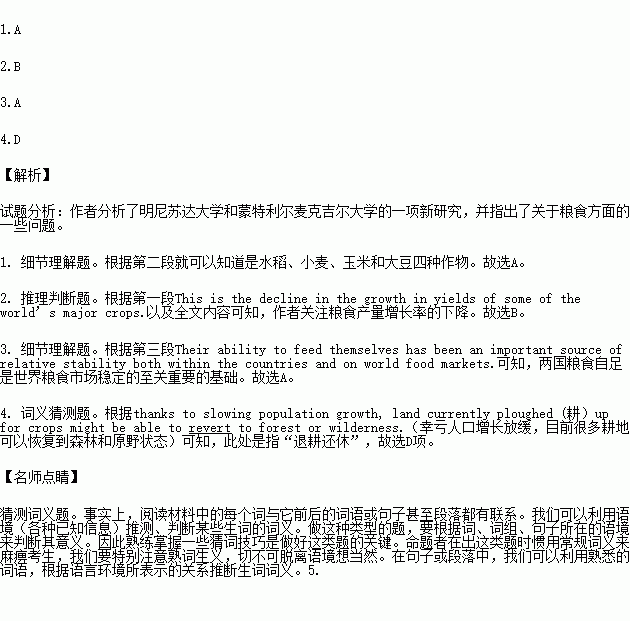题目内容
Some of the world’s most significant problems never hit headlines. One example comes from agriculture. Food riots(暴乱) and hunger make news, but the trend lying behind these matters is rarely talked about. This is the decline in the growth in yields of some of the world’s major crops. A new study by the University of Minnesota and McGill University in Montreal looks at where, and how far, this decline is occurring.
The authors take a vast number of data pointing for the four most important crops; rice, wheat, corn and soybeans. They find that on between 24 and 39% of all harvested areas, the improvement in yields that took place before the 1980s slowed down in the 1990s and 2000s.
There are two worrying features of the slowdown. One is that it has been particularly sharp in the world's most populous(人口多的) countries,India and China.
Their ability to feed themselves has been an important source of relative stability both within the countries and on world food markets. That self-sufficiency cannot be taken for granted if yields continue to slow down or reverse.
Second, yield growth has been lower in wheat and rice than in corn and soybeans. This is problematic because wheat and rice are more important as foods’ accounting for around half of all calories consumed. Corn and soybeans are more important as feed grains. The authors note that we have preferentially focused our crop improvement efforts on feeding animals and cars rather than on crops that feed people and are the basis of food security in much of the world.
The report qualifies the more optimistic findings of another new paper which suggests that the world will not have to dig up a lot more land for farming in order to feed 9 billion people in 2050, as the Food and Agriculture Organization has argued. Instead, it says, thanks to slowing population growth, land currently ploughed (耕)up for crops might be able to revert to forest or wilderness. This could happen. The trouble is that the forecast assumes continued improvements in yields, which may not actually happen.
1.Which crops are mentioned in the text?
A. Rice,corn,soybeans and wheat.
B. Rice,corn, wheat and peas.
C. Wheat,corn,soybean and potatoes.
D. Corn,wheat, tomatoes and soybeans.
2.What does the author try to draw attention to?
A. Food riots and hunger in the world.
B. The decline of the grain yield growth.
C. News headlines in the leading media*
D. The food supply in populous countries.
3.Why does the author mention India and China in particular?
A. Their self-sufficiency is vital to the stability of world food markets.
B. Their food yields have begun to decrease sharply in recent years.
C. Their big populations are causing worldwide concerns.
D. Their food self-sufficiency has been taken for granted.
4.What does the underlined word “revert” mean in the last paragraph?
A. grow worse
B. put in the place of another
C. gain through experience
D. go back to a previous state
 名校课堂系列答案
名校课堂系列答案

 ),并在其下面写出该加的词。
),并在其下面写出该加的词。